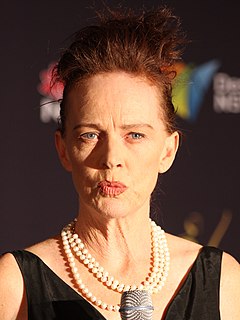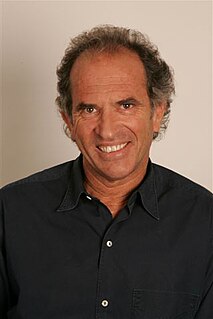Related Research Articles

The Australian Academy of Cinema and Television Arts Awards, known as the AACTA Awards, are presented annually by the Australian Academy of Cinema and Television Arts (AACTA). The awards recognise excellence in the film and television industry, both locally and internationally, including the producers, directors, actors, writers, and cinematographers. It is the most prestigious awards ceremony for the Australian film and television industry. They are generally considered to be the Australian counterpart of the Academy Awards for the U.S. and the BAFTA Awards for the U.K.

The AACTA Award for Best Actress in a Leading Role is an award presented by the Australian Academy of Cinema and Television Arts (AACTA), a non-profit organisation whose aim is to "identify, award, promote, and celebrate Australia's greatest achievements in film and television".
The AACTA Award for Best Actor in a Leading Role is an award presented by the Australian Academy of Cinema and Television Arts (AACTA), a non-profit organisation whose aim is to "identify, award, promote and celebrate Australia's greatest achievements in film and television." The award is presented at the annual AACTA Awards, which hand out accolades for achievements in feature film, television, documentaries and short films. From 1971 to 2010, the category was presented by the Australian Film Institute (AFI), the Academy's parent organisation, at the annual Australian Film Institute Awards. When the AFI launched the Academy in 2011, it changed the annual ceremony to the AACTA Awards, with the current award being a continuation of the AFI Award for Best Actor in a Leading Role.
The AACTA Award for Best Cinematography is an award presented by the Australian Academy of Cinema and Television Arts (AACTA), a non-profit organisation whose aim is to "identify, award, promote and celebrate Australia's greatest achievements in film and television." The award is presented at the annual AACTA Awards, which hand out accolades for achievements in feature film, television, documentaries and short films. From 1976 to 2010, the category was presented by the Australian Film Institute (AFI), the Academy's parent organisation, at the annual Australian Film Institute Awards. When the AFI launched the Academy in 2011, it changed the annual ceremony to the AACTA Awards, with the current award being a continuum of the AFI Award for Best Cinematography.
The Longford Lyell Award is a lifetime achievement award presented by the Australian Academy of Cinema and Television Arts (AACTA), a non-profit organisation whose aim is "to identify, award, promote and celebrate Australia's greatest achievements in film and television." The award is presented at the annual AACTA Awards, which hand out accolades for technical achievements in feature film, television, documentaries and short films. From 1968 to 2010, the award was presented by the Australian Film Institute (AFI), the Academy's parent organisation, at the annual Australian Film Institute Awards. When the AFI launched the Academy in 2011, it changed the annual ceremony to the AACTA Awards, with the current award being a continuum of the AFI Raymond Longford Award.

Robert John Edwards is an Australian television drama producer.
The AACTA Award for Best Television Comedy Series is an accolade given by the Australian Academy of Cinema and Television Arts (AACTA), a non-profit organisation whose aim is to "identify, award, promote and celebrate Australia's greatest achievements in film and television." The award is handed out at the annual AACTA Awards, which rewards achievements in Australian feature film, television, documentaries and short films. From 2003 to 2010, the category was presented by the Australian Film Institute (AFI), the Academy's parent organisation, at the annual Australian Film Institute Awards. When the AFI launched the Academy in 2011, it changed the annual ceremony to the AACTA Awards, with the current prize being a continuum of the AFI Award for Best Television Comedy Series.
The AACTA Award for Best Screenplay in Television is an award presented by the Australian Academy of Cinema and Television Arts (AACTA), a non-profit organisation whose aim is to "identify, award, promote and celebrate Australia's greatest achievements in film and television." The award is presented at the annual AACTA Awards, which hand out accolades for achievements in feature film, television, documentaries and short films. From 1986 to 2010, the category was presented by the Australian Film Institute (AFI), the Academy's parent organisation, at the annual Australian Film Institute Awards. When the AFI launched the Academy in 2011, it changed the annual ceremony to the AACTA Awards, with the current award being a continuum of the AFI Award for Best Screenplay in Television.
The AACTA Award for Best Lead Actor in a Television Drama is an accolade given by the Australian Academy of Cinema and Television Arts (AACTA), a non-profit organisation whose aim is to "identify, award, promote and celebrate Australia's greatest achievements in film and television." The award is handed out at the annual AACTA Awards, which rewards achievements in Australian feature film, television, documentaries and short films. From 1986 to 2010, the category was presented by the Australian Film Institute (AFI), the Academy's parent organisation, at the annual Australian Film Institute Awards. When the AFI launched the Academy in 2011, it changed the annual ceremony to the AACTA Awards, with the current prize being a continuum of the AFI Award for Best Lead Actor in a Television Drama.
The AACTA Award for Best Guest or Supporting Actor in a Television Drama is an accolade given by the Australian Academy of Cinema and Television Arts (AACTA), a non-profit organisation whose aim is to "identify, award, promote and celebrate Australia's greatest achievements in film and television." The award is handed out at the annual AACTA Awards, which rewards achievements in feature film, television, documentaries and short films. From 2000 to 2010, the category was presented by the Australian Film Institute (AFI), the Academy's parent organisation, at the annual Australian Film Institute Awards. When the AFI launched the Academy in 2011, it changed the annual ceremony to the AACTA Awards, with the current prize being a continuum of the AFI Award for Best Guest or Supporting Actor in a Television Drama.
The AACTA Award for Best Guest or Supporting Actress in a Television Drama is an accolade given by the Australian Academy of Cinema and Television Arts (AACTA), a non-profit organisation whose aim is to "identify, award, promote and celebrate Australia's greatest achievements in film and television." The award is handed out at the annual AACTA Awards, which rewards achievements in feature film, television, documentaries and short films. From 2000 to 2010, the category was presented by the Australian Film Institute (AFI), the Academy's parent organisation, at the annual Australian Film Institute Awards. When the AFI launched the Academy in 2011, it changed the annual ceremony to the AACTA Awards, with the current prize being a continuum of the AFI Award for Best Guest or Supporting Actress in a Television Drama.
The 2010 Australian Film Institute Awards ceremony, presented by the Australian Film Institute (AFI), honoured the best Australian films of 2010 and took place on 11 December 2010 at the Regent Theatre, in Melbourne, Victoria.

The Australian Academy of Cinema and Television Arts (AACTA) is a professional organisation of film and television practitioners in Australia. The Academy's aim is "to identify, award, promote, and celebrate Australia's greatest achievements in film and television".
The Inaugural Australian Academy of Cinema and Television Arts Awards, known more commonly as the AACTA Awards, presented by the Australian Academy of Cinema and Television Arts (AACTA), honoured the best Australian and foreign films of 2011 took place on two separate events, in Sydney, New South Wales: the AACTA Awards Luncheon, on 15 January 2012, at the Westin Hotel, and the AACTA Awards Ceremony, on 31 January 2012, at the Sydney Opera House. Following the establishment of the Australian Academy of Cinema and Television Arts, by the Australian Film Institute (AFI), these awards marked the inauguration of the AACTA Awards, but served as a continuum to the AFI Awards, which were presented by the AFI since 1958. The ceremony was televised on the Nine Network.
The 22nd Australian Film Institute Awards ceremony, presented by the Australian Film Institute (AFI), honoured the best Australian feature films of 1980, and took place on 17 September 1980 at Regent Theatre, in Sydney, New South Wales. The ceremony was hosted by Graham Kennedy and televised in Australia on ABC.
The 1st Australian Academy of Cinema and Television Arts International Awards, were presented by the Australian Academy of Cinema and Television Arts (AACTA), a not for profit organisation whose aim is to identify, award, promote and celebrate Australia's greatest achievements in film and television. The Academy, which normally hand out awards to Australian made films, presented awards for the best films of 2011 regardless of geography.
The 2nd Australian Academy of Cinema and Television Arts Awards are a series of awards which includes the 2nd AACTA Awards Luncheon, the 2nd AACTA Awards ceremony and the 2nd AACTA International Awards. The former two events were held at the Star Event Centre, in Sydney, New South Wales on 28 January and 30 January 2013, respectively. Presented by the Australian Academy of Cinema and Television Arts (AACTA), the awards celebrated the best in Australian feature film, television, documentary and short film productions of 2012. The AACTA Awards ceremony was televised on Network Ten. Actor Russell Crowe hosted the show. These awards are a continuum of the Australian Film Institute Awards, established in 1958 and presented until 2010, which was rebranded the AACTA Awards when the Australian Film Institute (AFI) established AACTA in 2011.
The 3rd Australian Academy of Cinema and Television Arts Awards are a series of awards which includes the 3rd AACTA Awards Luncheon, the 3rd AACTA Awards ceremony and the 3rd AACTA International Awards. The former two events were held at The Star Event Centre, in Sydney, New South Wales on 28 January and 30 January 2014, respectively. Presented by the Australian Academy of Cinema and Television Arts (AACTA), the awards celebrated the best in Australian feature film, television, documentary and short film productions of 2013. The AACTA Awards ceremony were televised on Network Ten. These awards were a continuum of the Australian Film Institute Awards, established in 1958 and presented until 2010, which was rebranded the AACTA Awards when the Australian Film Institute (AFI) established AACTA in 2011.
The 35th Australian Film Institute Awards were held on 5 November 1993. Presented by the Australian Film Institute (AFI), the awards celebrated the best in Australian feature film, documentary, short film and television productions of 1993.
References
- ↑ Flynn, Greg (16 September 1981). "Highlights of the week". Australian Women's Weekly. ACP Magazines (Nine Entertainment Co.). p. 165. Retrieved 6 May 2014.
- ↑ "3rd AACTA Awards - Tickets On Sale Now". AACTA. Archived from the original on 5 November 2013. Retrieved 13 December 2013.
- ↑ Flynn, Greg (14 October 1981). "Stars come out in award winning style". Australian Women's Weekly. ACP Magazines (Nine Entertainment Co.). pp. 186–187. Retrieved 6 May 2014.
- ↑ "TV guide - Evening September 16 Wednesday". Australian Women's Weekly. ACP Magazines (Nine Entertainment Co.). 16 September 1981. p. 171. Retrieved 6 May 2014.
- ↑ "1981 Winners & Nominees". AACTA. Retrieved 9 July 2014.